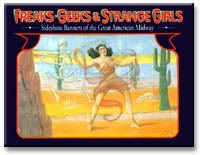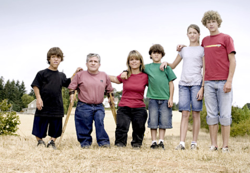In some circles, a midget is the term used for a proportionate dwarf. However, the term has fallen into disfavor and is considered offensive by most people of short stature. The term dates back to 1865, the height of the "freak show" era, and was generally applied only to short-statured persons who were displayed for public amusement, which is why it is considered so unacceptable today.
By the time I was in my teens, having traveled around the country with my parents, I'd occasionally have a sighting of a little person out in the real world. Like most folks at the time, we called them midgets. My adolescent instinct was to think of them as freaks. Although it was not something I dwelled on for more than a few minutes, I would wonder what their horribly pathetic lives must be like. I lumped them in with the retarded and others with deformities.
I am ashamed to admit that I never altered my opinion very much as I moved into adulthood. Chalk it up to being misinformed and a lack of interest in exploring the issue on my own. I honestly didn't want to know much about it. Life can be miserable at times for anyone, and I didn't want to imagine or explore the lives of people I deemed horrible.
"Life is divided into the horrible and the miserable."
--Woody Allen
So, here I am in my mid-40s and finally having a truthful awakening.
txrad is somewhat more intellectually curious about certain things than I am. He finds programs to watch on tv and I'm often reluctant to watch because I don't find the theme or subject matter appealing. I'll usually come around to his side eventually. Such was the case with Iron Chef America -- a program I initially had zero interest in watching, and now it's one of my weekly addictions.
Recently he started watching a program on The Learning Channel called Little People Big World. The first time he had the show on, I figured that was a good time for me to go read blogs or do something I wanted to do. The last thing I wanted to watch was a reality show about
Several weeks ago he had the show on again and in the midst of my huffing and puffing to express my displeasure, he said to me, "I think you'll enjoy this. Watch it."
So I did. Within about 10 minutes I was not only watching it, I was hooked. And not in the weird freakshow sense. I sat through a marathon viewing of several episodes. This is probably the best series I've seen in a long time -- and if you want to categorize it as a reality program, then it's probably my all-time favorite since I'm not that gung-ho about the genre. If that seems like I'm diminishing the program, I'm not. This clearly would be in my top-10 favorite programs of the past decade or two.
For starters, it immediately gave my preconceived belief system a case of whiplash. How on earth could I have been so ignorant all my life? Little people are not freaks, nor are they miserable. Well, maybe when they are having to undergo multiple surgeries to correct various complications, but generally they are as happy with their lives as the rest of us.
They are a remarkable family, and the program does an incredible job of illustrating just how normal they are compared to the rest of society. Some of them are just shorter than average. Amy Roloff, the wife and mother of four, is sublime. She reminds me of Cheryl Hines -- in both appearance and personality.
If you haven't seen this series, I give it my highest recommendation. I am thankful to have one more horrendously ugly stereotype blown away.
Matt Roloff and his family are actively involved in the Little People of America, a nonprofit organization that provides support and information to people of short stature and their families.
Learn more about Dwarfism.
Dwarfism
* is a condition characterized by short stature. Technically, that means an adult height of 4 feet 10 inches or under, according to the advocacy group Little People of America (LPA).
*can be caused by any one of more than 200 conditions, most of which are genetic. The most common type, accounting for 70% of all cases of short stature, is called achondroplasia.
*can and most often does occur in families where both parents are of average height. In fact, 85% of children with achondroplasia are born to average-size parents.
Dwarfism isn't:
*an intellectual disability. A person who has dwarfism is typically of normal intelligence.
*a disease that requires a "cure." Most people with the condition can live long, fulfilling lives.
*a reason to assume someone is incapable. Little people go to school, go to work, marry, and raise children, just like their average-size peers.



No comments:
Post a Comment